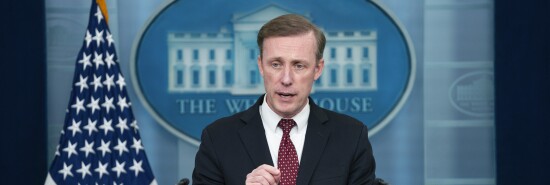
Israel should ignore Jake Sullivan
Michael Rubin
Video Embed
National security adviser Jake Sullivan flew to Israel for emergency consultations with Prime Minister Benjamin Netanyahu on Thursday. According to press reports from Israel, Sullivan told Netanyahu that Israel must “transition to the next lower intensity phase in a matter of weeks, not months.”
Netanyahu should ignore Sullivan.
SHADOW OF DOUBT: FBI ‘KEENLY FOCUSED’ ON ‘ELEVATED’ RISK OF OUTSIDE INFLUENCE IN 2024 ELECTION
Sullivan rose to the White House upon connection and credential rather than merit and substance. As an aide, he intuitively understood how to ingratiate himself to his mentors. Ambition and triviality always trumped serious strategy. Leaked Hillary Clinton emails showed Sullivan conspiring to allow her to set records of countries visited and miles flown rather than the advancement of any national security strategy.
While Netanyahu served in the military, Sullivan never did, nor did he ever travel independently in challenging locations. He was a Rhodes scholar in the United Kingdom and traveled from there to Israel, but, unlike his deputy Jon Finer, who backpacked around India and served as a Washington Post correspondent in a war zone, Sullivan’s experience abroad has always been on trips arranged by others where he interacted with those who viewed the world much as he did.
The difference between academic understanding and military service is the difference between theory and reality. The most gifted strategists listen and learn rather than dictate. They understand the limitations of their worldview and learn from mistakes.
Here, too, Sullivan fails. When Barack Obama won the presidency, he launched a review of American strategy toward Afghanistan and Pakistan that he unveiled in a Dec. 1, 2009, West Point address. That he imposed a time frame but omitted talk of victory stood in sharp contrast to predecessor George W. Bush’s announcement of the surge in Iraq. The Taliban understood Obama’s speech meant time was finite and they need not beat, only outlast, the forces of democracy. It was a disastrous move, one that Sullivan seemingly endorsed.
The difference between Sullivan and many of his peers who also affirmed Obama’s time frame is that others learned. They did not prioritize Washington politics above stopping the surge in momentum with which the strategy imbued the Taliban. In Jerusalem, however, Sullivan effectively repeats the Obama logic: Impose a time frame rather than calibrate military action to specific goals such as the eradication of Hamas.
What Israelis understand but Sullivan does not is that Hamas will spin its survival as a victory over Israel, much as Hezbollah did when Secretary of State Condoleezza Rice pressured Israel to throw in the towel in 2006 against the backdrop of Lebanese civilian casualties and international pressure. Israel was compelled to cease its operations, and the world turned a blind eye as Hezbollah transformed itself into a far more potent force.
Should Hamas survive, terrorism will win and the Iranian clerical leaders will feel themselves closer to their ultimate goal of eradicating the Jewish state. Put simply: Any ceasefire short of Hamas’s complete and humiliating defeat will start the countdown to Israel’s destruction. Sullivan may worry about President Joe Biden losing Michigan; Netanyahu is concerned about a second Holocaust. The two are not concerns of equal merit.
Nor will it be lost on Netanyahu that Sullivan’s previous actions at least indirectly contributed to Israel’s current predicament. Sullivan initiated negotiations with Iran, both out of naivete and ambition, but he misread his Iranian partners. Iranian reformers were never sincere but rather enmeshed Sullivan in an elaborate game of good cop, bad cop. Iranian diplomats dangled deals while seeking time and resources to continue the regime’s terrorist support and covert nuclear program. Sullivan’s backers might say the 2015 nuclear deal was foolproof. It wasn’t; it addressed only enrichment rather than delivery systems, military aspects of the program, and terrorism.
For Sullivan, whom Chinese, Turkish, and other dictators regularly steamroll, to try to strong-arm Netanyahu is ridiculous. The United States must not bully allies while appeasing adversaries. It should not expect of Israel any action different from what the United States did to defeat the Islamic State. Today, Sullivan might threaten a withdrawal of U.S. protection at the U.N. or even weapons, but Israel cannot bet its existence on inconsistent politicians or aides worried more about their next election or cocktail circuit approval.
CLICK HERE TO READ MORE FROM THE WASHINGTON EXAMINER
Michael Rubin is a contributor to the Washington Examiner’s Beltway Confidential blog. He is the director of policy analysis at the Middle East Forum and a senior fellow at the American Enterprise Institute.
